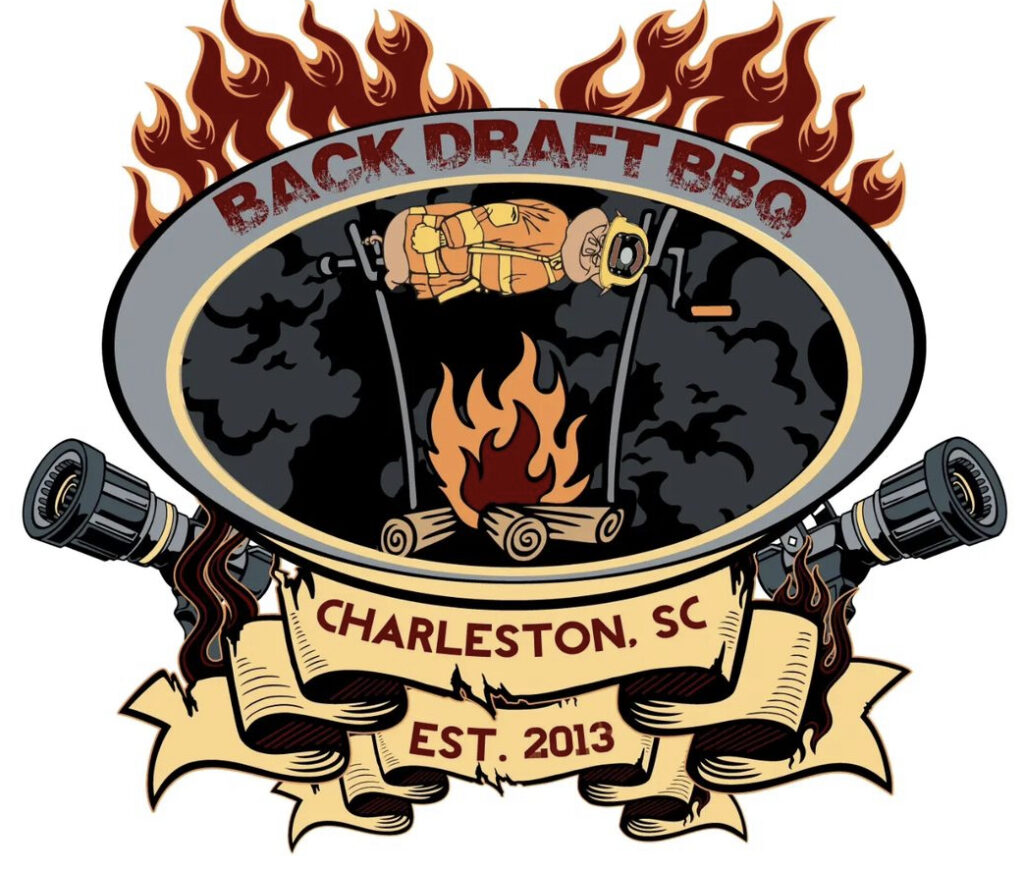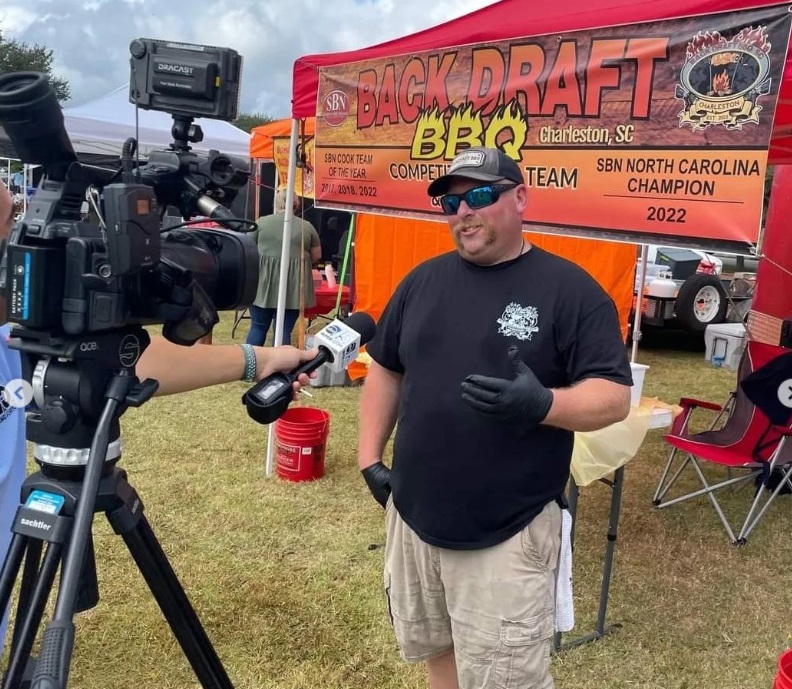Are you looking for an entry point to the world of competition BBQ in the Carolinas?
Whether you’re a seasoned pitmaster or a barbecue enthusiast looking to break into the competitive scene, The Low & Slow Barbecue Show can help. This blog – and our recent BBQ Competition Behind the Scenes podcast episode – are your go-to resources.
Keep reading to dive into competition BBQ with insights from experts, including seasoned judges and top competitors. Learn about the Southern BBQ Network, the training process for becoming a certified barbecue judge, and the meticulous techniques leading teams like Backdraft BBQ use.
Get ready to elevate your barbecue game and discover what it takes to excel in competition BBQ.
What is the Southern BBQ Network?

The Southern BBQ Network (SBN) is a cornerstone of competitive BBQ in the Carolinas.
“The purpose is to preserve the tradition of southern barbecue and … principles of fairness by judging through training classes and a blind judging system with a fair scoring system added to it as well,” says SBN Competition Director Mike Wright.
Established in 2010 by a group of barbecue enthusiasts, SBN offers a robust competition BBQ judge certification program and organizes numerous events to support charitable causes. As a 501c3 organization, SBN makes an annual contribution to charity.
In the past, proceeds have supported Shriners Children’s Hospitals, the Sumter Red Cross, Harvest Hope Food Bank, Summerville Miracle League, Meals on Wheels, the Veterans Victory House, and Jeff Gordon’s Children’s Center, among others.
With 20+ events annually, SBN plays a vital role in the Carolina charitable competition BBQ barbecue community and ensures competitions are judged with integrity.
“We provide judges, but all the judges have to go through a certified judges training session,” Mike says. “All these members are volunteers.”
What Goes into Training a Barbecue Judge?
Southern BBQ Network training for competition BBQ judges is a thorough process designed to eliminate personal biases and ensure consistency in judging. Prospective judges complete a 3-4-hour training session covering the four main competition meats: pork butts, pork ribs, chicken, and brisket.
Training emphasizes four areas of criteria; Mike explains:
- Appearance: Appearance is relatively simple. What do you see in the box? Does it look like something you want to eat?
- Aroma: You want to get a hint of the smoke smell. Some competitors like to use different woods. As a result, you’re looking for various kinds of aromas.
- Taste: Taste is just that. You’re looking for certain tastes. You want to make sure that the barbecue sauce is not overpowering the pork because you’re judging the pork. You’re not judging sauce.
- Texture and Tenderness: Texture and tenderness are the crux of judging. They speak to each competitor’s ability to cook the meat properly so that it is not overdone or underdone.
See SBN’s competition BBQ judge requirements here.
“There’s techniques that we train them to recognize what characteristics they need to be looking at,” Mike says.
SBN offers about four training courses for judges each year.
“It’s open to anybody,” he says. “The only restriction is they have to be over 16 years of age. We do have a junior classification they can get involved in. We also do kids’ competitions periodically, which we enjoy doing a lot to get them in the groove.”
How does competition BBQ judging work?
A “double-blind” judging process begins when competition BBQ participants submit their smoked meat entries at the receiving station.
“That receiving station is isolated, so neither the judges nor anyone else can see them,” Mike says. “After they are checked in, they’re verified that their numbers are correct and that the product they’re turning in is correct.”
From there, the submission is transferred to another isolated location where the box is renumbered and assigned to a judging table.
“When all the boxes have been turned in, and they’re all sorted out by which table they’re going to, the table captains will take those boxes to each of the stations, and they will commence with the judging process.”
Judges use a scoring system from 1 to 10 and provide feedback through comment cards to help competitors improve their future entries. Feedback shares insight into what judges liked or why the entry wasn’t scored higher.
“They have absolutely no idea who this feedback is going back to,” he continues.
What is Backdraft BBQ?

Backdraft BBQ is a competitive barbecue team led by Eric Carpenter, a full-time firefighter passionate about barbecue. Known for dedication and consistent performance, Backdraft BBQ has been a formidable contender in the barbecue circuit for over a decade.
Eric, supported by his family, has competed in over 100 competitions across various states, from the Carolinas to New York and Alabama. Specializing in pork, Eric’s meticulous approach to preparation and cooking earned Backdraft BBQ numerous grand champion awards.
What is the Competition BBQ Process for Backdraft BBQ?
Eric Carpenter of Backdraft BBQ shared his meticulous process for preparing competition BBQ pork with The Low & Slow Barbecue Show.
- Meat Preparation: Upon receiving the pork, Eric trims it conservatively to expose the money muscle.
- Injection: He injects the meat with a mix of apple juice, pineapple juice, and a custom rub, allowing it to marinate for four hours.
- Rub and Binder: A mustard binder helps the rub adhere to the meat. Backdraft BBQ’s “every day” rub ingredients include brown and white sugar and various spices.
- Smoking: Eric uses a pellet cooker set to 210-215°F, smoking the pork for about seven to eight hours before wrapping it to finish the cook, totaling around 9-12 hours, depending on the size.
- Resting and Turn-In: After cooking, the meat rests in a hot box before being meticulously boxed for judging.
Eric emphasizes the importance of consistency and continuous practice.
“If you’re cooking once or twice a year, you may not put out the best product,” he says. “If you’re cooking every weekend, whether it’s competing or just cooking in the backyard, you’re probably going to put out a little bit better product.”
Meanwhile, Eric is an SBN team liaison and a certified judge.
“But I‘ve never actually judged a competition,” he says. “I just enjoy cooking them too much.”
Still, the judge certification offers insight into what it takes to win a competition.
“It helps me a little bit because you have more of an understanding of what the judges are actually looking for in terms of the taste, the aroma,” he says. “You may not get a clear direction of what they want, but it steers you towards that right direction.”

Join the Low and Slow Barbecue Show Community
For more insights, recipes, and barbecue news, subscribe to The Lowdown, our weekly newsletter. Visit LowSlowBBQShow.com to stay updated on the latest in competition BBQ.
Want more?
- Podcast Episodes
- Barbecue Blogs
- BBQ News & Recipes
Subscribe to The Lowdown BBQ Newsletter!


